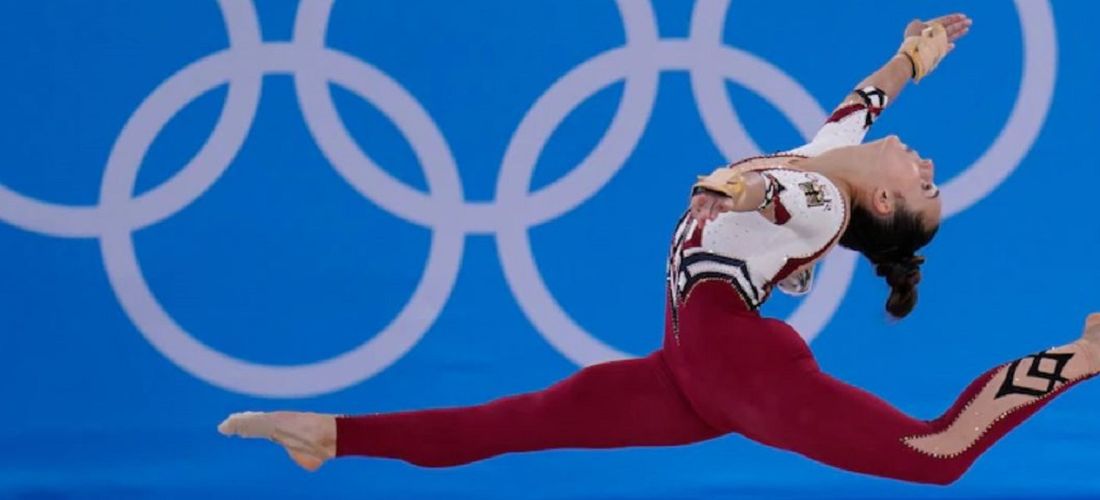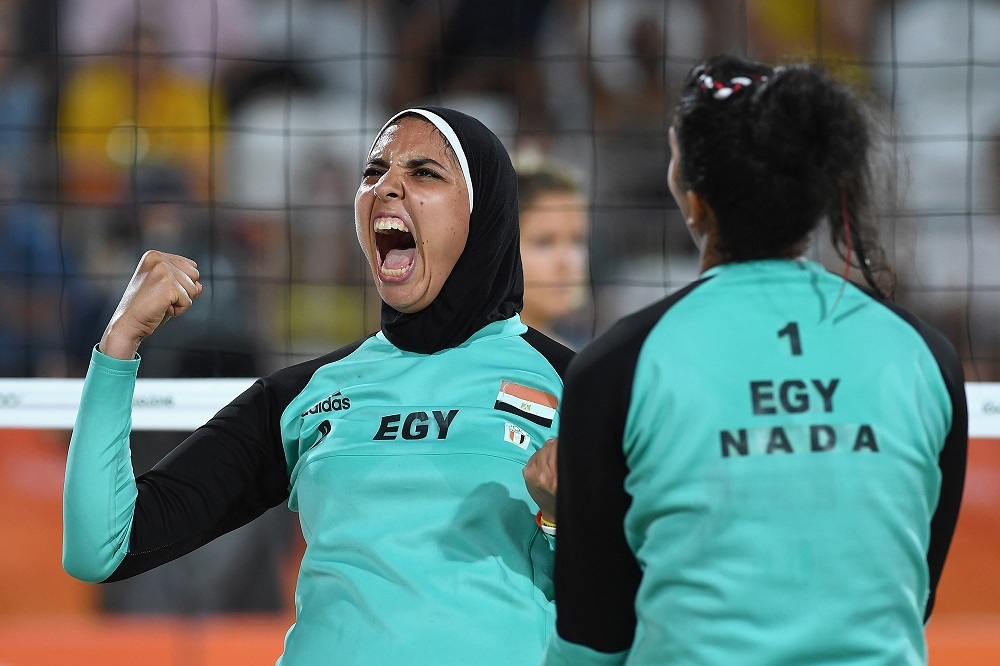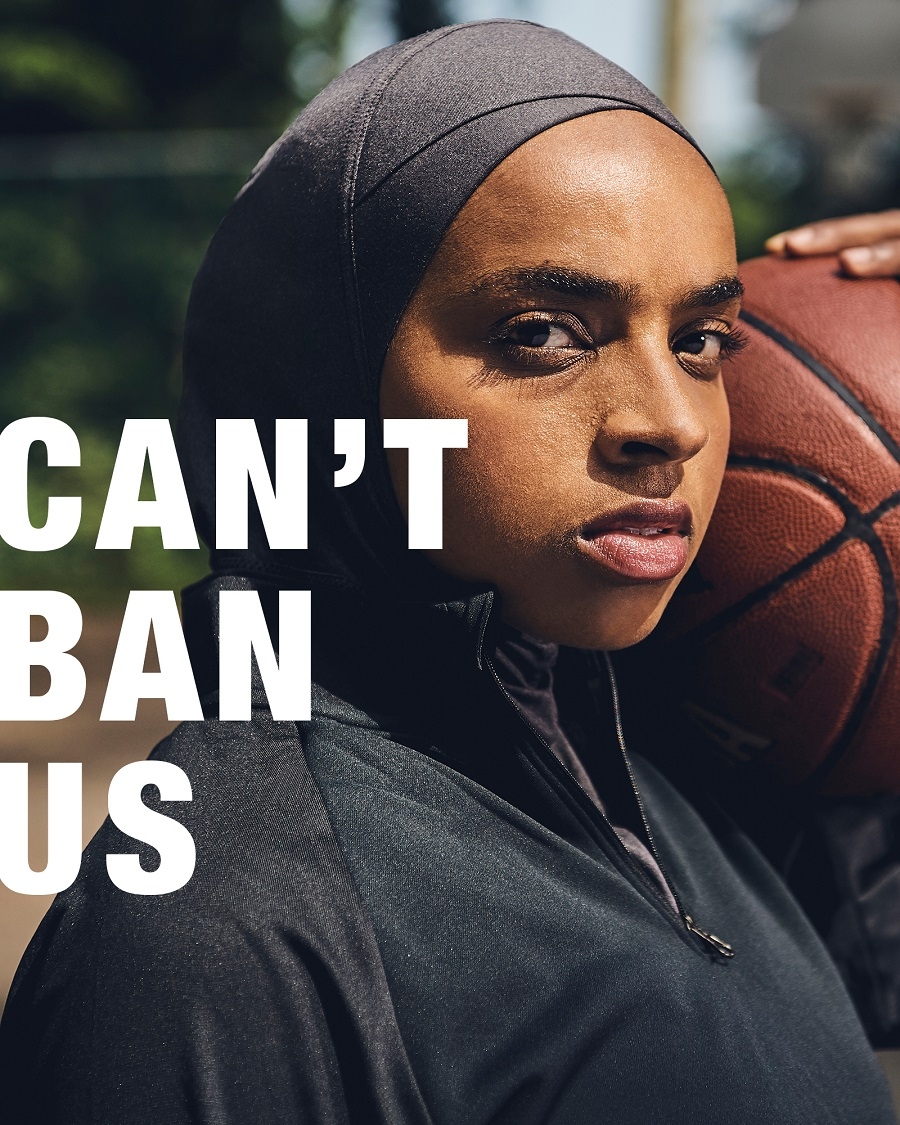#CantBanUs at the Olympics – Female Athletes Should Wear What They Want, Including Hijabs
Current Events
|
Jul 29, 2021
|
5 MIN READ

German gymnast Pauline Schaefer-Betz performs at the 2020 Tokyo games in a full unitard; image source AP and Twitter
“We wanted to show that every woman, everybody, should decide what to wear,” said German gymnast Elisabeth Seitz to reporters this week at the 2020 Tokyo Summer Olympics. “That doesn't mean we don't want to wear the normal leotard any more. It is a decision day by day, based on how we feel and what we want. On competition day, we will decide what to wear."
Imagine that – wanting to de-sexualize athletic clothing and wear what one chooses to wear in competition. Seitz’s comments came after the German gymnastics team chose more coverage in their uniform over their bikini-cut leotards. And this came just days after the uproar over Norway women’s beach handball team was fined for choosing to wear shorts instead of bikini bottoms in their Olympics competitive play as required by the International Handball Federation.
We applaud the efforts of the German Olympics Women’s Gymnastics team and the Norwegian Olympic Women’s Handball team to assert their right to wear what they want to wear, to choose clothing that de-sexualizes their sport. Hijab-wearing Muslim women have been fighting for their right to compete in hijab from school to college and all the way to professional levels for years. Our ongoing “#CantBanUs” campaign is just about that – the right to dress modestly and in hijab (or however one wants to) as a Muslim athlete.
But admittedly, it’s a bit frustrating when so much attention is paid to these Olympic teams and their fight for freedom of choice in their athletic apparel as a shining example of feminism. I'm reminded of the summer games in Rio de Janeiro in 2016, when the Egyptian beach volleyball team in full coverage received little love (and more than their fair share of ridicule) when they went up against the bikini-clad German women's team.

Egyptian beach volleyball team at the Rio de Janeiro games in 2016. Image source: Pinterest
Or, as Dalia Mogahed recently said on Instagram:
“Really happy for the German team. What a discovery. Bravo! More clothing means feminism not oppression? What?! And yet … the Egyptian women’s volleyball team got no love for their chosen attire playing bikini-clad Germany in 2016. Yes, Germany – [the] same country now discovering the benefits of choosing to cover to the applause 👏🏽 of every media outlet. Love it when white women receive standing ovations for saying or doing what we’ve been receiving ridicule and condemnation for saying or doing for a thousand years.”
Maybe her sarcasm feels a bit much. But maybe not. Several European countries in recent years have seen Islamophobic attacks ramp up as well as legislation passed against hijab and other displays of religion in public sectors. Last spring I interviewed Rim-Sarah Alouane, a Ph.D. candidate in comparative law and a researcher/legal academic at the University of Toulouse, France, about a hijab ban amendment, the history of anti-hijab sentiment in France and where it all stems from.
One thing she told me really stayed with me:
“It’s all about visibility. Nobody cares about the hijab when it's your maid who is wearing it. Because when Layla is going to clean a senator’s office, she is invisible. But when Layla’s kid, Sumayra, is highly educated, went to college, wears hijab, wants to have a more visible position and is fighting for her rights and is doing things that are very empowering, her visibility becomes a problem.
It’s a problem of feminism as well. You do have a lot of feminists who are anti-hijab. And it’s a matter of power and domination: ‘We know better. We are going to decide what is good for you. We’re going to end political Islam by telling a mother she cannot wear hijab on a school trip, or a hijabi footballer that she cannot wear hijab though she is a skilled player, or a young woman that she can’t wear a burkini on the beach.’ It’s a colonial mentality.
France never asks Muslim women what they think. Because imagine if we did – we are empowering them.”
The fact is, we should ask Muslim women what they think, what they want and support them. We should be able to decide for ourselves. Haute Hijab wants Muslim women, and all women, to feel empowered in their ability to dress in manner that suits them, their comfort level, their religiosity or whatever it is that drives them.

Basketball player Bilqis Abdul-Qaadir
Of course we focus on the rights of Muslim women to be able to play sports, compete and do anything they want to do while wearing hijab and modest clothing. And, we expect that the policing of Black and Brown Muslim women’s clothing choices and how they choose to exercise their religious preferences receive the attention and support on par with, if not more, than other communities.
As sports activist and journalist Shireen Ahmed writes for TRT World, “I am not upset that people started to care about Norwegian women athletes’ lack of choice. It is indeed egregious, and part of a wider system of sexism in sport. But the lack of outrage for Black and Brown women in sport does not escape me.”
She goes on to add that when France hosted the women’s world cup in 2019, Muslim women of that same country who chose to wear hijab could not play, coach, officiate or be part of a team in any way.
How outrageous is that? And, where was the global outrage when this went down? Where is the ongoing global outrage now about France’s hijab ban amendment and targeting of visibly Muslim women? There’s certainly support and outrage afoot now that it’s not just a “hijab” or “Muslim” issue.
The ability and right to wear one’s hijab or religious head covering is very important to us because we know that one’s ability to engage in sports, run a company, be a teacher, care for one’s family, work in STEM or whatever is limitless and unaffected by clothing choices. The ability and right to wear shorts instead of bikini bottoms or a full suit instead of bikini-cut leotards is important as well.
It comes down to a woman’s ability to decide for herself what makes her feel comfortable and confident.
Learn more about our #CantBanUs campaign here, and how you can share your story and offer support.
Subscribe to be the first to know about new product releases, styling ideas and more.
What products are you interested in?

